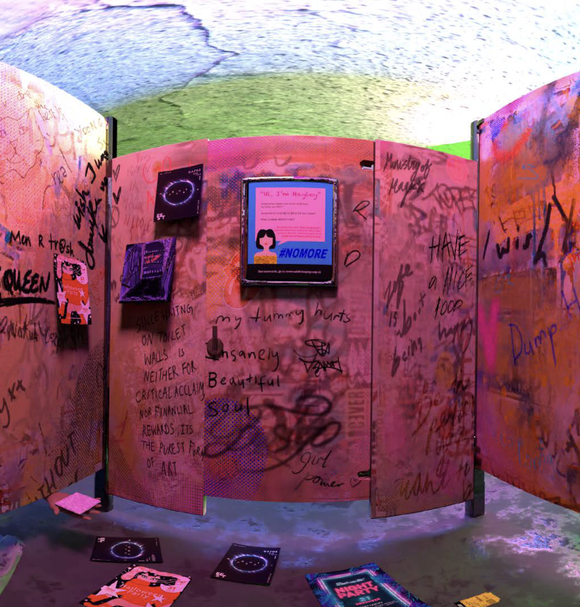
Key details
Date
- 19 November 2024
Author
- RCA
Read time
- 3 minutes
This World Toilet Day we are celebrating the work of graduating MA students from across the RCA whose work explores toilet, menstrual health and continence-related challenges.
Key details
Date
- 19 November 2024
Author
- RCA
Read time
- 3 minutes
Student projects
Pera: The world’s first smart health assistant for digestive tracking to manage bowel incontinence
by Alexander Spencer, Hanju Seo , Maria Asif and Sven Winkler Von Steirnhielm, MA/MSc Innovation Design Engineering (2024).
Pera is a smart health assistant for people with bowel incontinence. The wearable device offers real-time continuous monitoring of bowel activity and provides users with predictive insights through Pera’s paired app. Pera aims to erode the taboo associated with bowel incontinence and give people their freedom back, and advance preventative technology in gastrointestinal healthcare.
A staggering 1 in 10 people have bowel incontinence, often hidden through shame and taboo. It can occur at any age and with various conditions, such as IBS, IBD, Parkinson’s, Spinal Cord Injuries, MS, and after childbirth.
Pera allows users to specify their circumstances and background, which forms the basis of a personalised experience, further enhanced by machine learning. Pera also features intuitive controls and adjustable settings, catering to a spectrum of abilities. The technology can predict passing stool 40 minutes in advance, giving sufferers of bowel incontinence the ability to plan ahead.
Pera was the winner of the Northumbrian Water Group Award for Inclusive Innovation at the 2024 Helen Hamlyn Awards.

STALL: VR short film to de-stigmatise menstruation
Ruby Bell, Zoe Shum, Aarti Bhalekar, Ah Young Shin, MA Digital Direction (2024).
STALL is a short virtual reality film that aims to destigmatise menstruation. More than 1 in 3 of UK women have experienced period shaming. Research suggests that nearly half (46%) of UK women said they felt embarrassed the first time they got their period, 35% said they felt scared and 24% felt confused.
In the film, the viewer experiences the story from the perspective of a young person who gets their period for the first time. Too embarrassed to ask for help, they travel through the toilet multiverse in search of a pad.
Along the way they learn that talking about menstruation is nothing to be ashamed of.
In December 2023, the film was exhibited in the RCA’s School of Communication in a pop-up toilet stall where people could watch the film in VR from a theatrical toilet seat.
The film is currently being shown in York as part of Aesthetica Film Festival’s VR Lab.
Save the Loo: A service for the rebirth of closed public toilets through re-use and destigmatisation
Chenying Chen and Ting-Hsuan Chang, MA Service Design (2024)
Save the Loo is a service that aims to revive closed public toilets through business partnerships and change public perception of public toilets through a toilet museum.
A third of public toilets in the UK closed between 2000 and 2021, due, in large part, to tight council finances. The longer a unit is vacant, the more expensive it becomes to reopen.
Save the Loo’s Toilet Rebirth Scheme proposes to lease closed public toilet units to start-ups for their own business needs. They would initially be rent-free, with subsequent reduced rent set aside for restoration of the unit. After a one-year period, the unit would either be fully restored as a public toilet, continue to operate as the business with a publicly accessible toilet, or continue solely as a business at the full rental rate.
This imaginative business model is accompanied by a toilet museum within the city. The toilet taboo – a persistent reluctance for the UK public to discuss public toilets or acknowledge problems caused by their absence – leads to further deterioration. Save the Loo’s Toilet Museum is a permanent collection to celebrate the humble loo, hosting public events around known issues, new knowledge and beautiful design.
Public Toilets Research Unit
The RCA is also home to the Helen Hamlyn Centre for Design’s Public Toilets Research Unit. Led by Gail Ramster, it is currently running an impact project with fellow researchers Dr Katie Gaudion and recent graduate Beatrice Sangster (MA Visual Communications, 2023). The project Space in Mind: Mapping Neurodivergent Journeys through Sensory, Emotional and Social Experiences at the Royal College of Art will explore public spaces including public toilets, to better understand and improve these common environments for neurodivergent staff and students.
Gail Ramster and Dr Jo-Anne Bichard, who recently retired from her position as Professor of Inclusive Design at the Helen Hamlyn Centre for Design, have written a book Designing Inclusive Public Toilets: Wee the People. Drawing on their years of research into toilet design, public services, accessibility and social injustice, Designing Inclusive Public Toilets explores the complexities around using these facilities and examines a diverse array of design considerations related to age, disability, neurodiversity and gender. It discusses examples of successful and failed public toilet designs, and presents an innovative approach for the future that reframes a space associated with unpleasantness and inaccessibility as one at the heart of the UK’s public realm.
Designing Inclusive Public Toilets will be published in June 2025 by Bloomsbury, and can be pre-ordered now.

